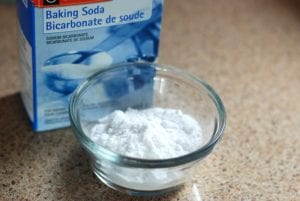
Baking soda is one of the many items used to dilute or replace street drugs.
Pretty much everyone knows that selling illegal drugs will, if you’re caught, earn you a one way ticket to prison. Get busted selling cocaine or heroin, or even medical marijuana without a state-issued caregiver card, and you’re toast. But did you know you can also get into trouble for selling fake drugs? That’s right, sell someone a baggie of baking soda that you claimed was cocaine, or a few aspirins that you doctored up to look like ecstasy, and you’ll be in just as much trouble as if those drugs had been real!
A Coldwater man is headed to prison for selling fake drugs!
Joseph Alan Davis, a 30-year-old man from Coldwater, Michigan, was recently convicted of selling fake drugs to a confidential informant for the Hillsdale Narcotics Enforcement Team. According to court records, Davis was given a message that a lady was looking to buy cocaine and Norco 10s, which is a combination of acetaminophen/hydrocodone, and is only available by prescription.
Davis decided to get crafty and make a substitute drug to sell
“I couldn’t get any of that, but I knew I could make a lookalike of meth and crack cocaine.” Davis explained to the Judge. He went on to say that he used sea salt mixed with Ambien to create fake cocaine. Although lab reports from the Michigan State Police Crime Lab do show a small amount of residual meth was found in the counterfeit coke, Davis claimed to know nothing about it. Why? Because according to him, at the time he had no drugs at all, or he would have used them himself. “I sold it to her to support my habit,” he explained to the Branch County judge. “I didn’t have no dope at all.”
In Michigan, selling fake drugs is still a felony
Under Michigan law, “creating, manufacturing, delivering, or possessing with intent to deliver” any kind of fake illegal drug is a felony. In fact, depending on which type of drug you’re attempting to mimic, your charges could range anywhere from 2 years in prison and fines of up to $2,000, up to 15 years in prison with fines of up to $250,000. Either way, it isn’t a charge to be taken lightly!
What counts as a “counterfeit controlled substance” in Michigan?
Technically, a counterfeit controlled substance is any substance that isn’t a drug, that a reasonable person would believe is a drug because of its similarity in shape, size and color, or its markings, labeling, packaging, or distribution. In other words if it looks like a drug, and someone believes it’s a drug, then it counts as a counterfeit substance.
What items are used as fake drugs to fool buyers?
The list of items used to mix with real drugs to make them go further, or sold as replacements for illicit drugs, is very long. Here’s a short list of a few household items that often get used as fake drugs, primarily in lieu of cocaine and heroin:
Baking soda,
Baby powder,
Crushed aspirin,
Lidocaine,
Chloroquine (a malaria medication),
Powdered caffeine, Laxatives,
Laundry detergent,
Boric acid,
Levamisole (a cattle dewormer),
Powdered milk,
Powdered sugar,
Starch,
Rat poison
Selling real or fake drugs will get you into lots of trouble in Michigan
Whether you’re accused of selling real illegal drugs, or counterfeit substances designed to look like drugs, you’re going to need help from an experienced drug defense attorney. The Kronzek Firm attorneys have successfully fought drug charges throughout Michigan for decades, and have helped many people avoid long prison sentences and crippling fines. Call us at 866 766 5245 (866 7No Jail) to get the help you need.